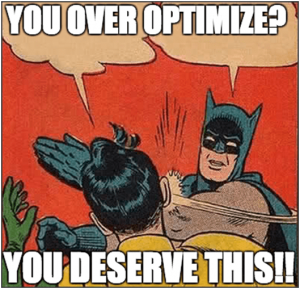Too much of a good thing can turn into a bad thing. This popular quote also applies to search engine optimization. If you are caught over-optimizing your website, Google can easily demote your rankings or ban you altogether. This is why you need to be smart with your optimization campaign. You have to make sure that everything you do is done within the parameters put forth by Google. You must stick to the rules and policies by the search engine. To help you out, below are some of the most practical strategies on how to avoid over-optimizing your site for Google.
1. Diversify your keywords.
What does this mean? Well, in the simplest of terms, you need to use variations of keywords and phrases. Don’t just use the same keywords over and over again. If you do this, your website will likely be flagged for keyword stuffing. This overuse of terms will be very detrimental to the rankings of your website. With that said, it’s highly recommended that you make use of keyword tools or apps to look for variations of the keywords and phrases that you utilize in your website.
2. Make sure that all your content is unique.
Duplicate content is one of the biggest reasons why Google would flag or demote a website. This refers to both outside and internal content. Every page on your website should contain unique content. Overlapping and redundant pages will raise alarms for Google’s spiders and crawlers.
3. Go steady with the link-building campaign.
Yes, backlinks to your site are good but they can hurt your website if these are coming from the wrong websites. The general rule here is that you should focus your attention on getting backlinks from reputable and legit sources. Google and other search engines are getting smarter in determining the quality of backlinks. If they find out that many of your links are coming from shady sources, then your website will be in big trouble.
4. Be smart with your internal linking practices.
Again, linking content within your website to each other is beneficial but it can be harmful if done too much. You should do it sparingly and avoid linking your content together using exact keywords and phrases. Over-linking using exact keywords will once again raise alarms about keyword stuffing.
5. Do not stuff keywords in your website footer.
This is a simple tip that a lot of webmasters take for granted. Placing too many keywords and internal links in your website footer will hurt your rankings more extensively than you think. Always remember that your footer is in view in every page of your website. This means that it’s constantly crawled and indexed by Google.
In conclusion, whether you are performing the optimization yourself or you are getting SEO services, it’s very important that you are aware of the tips and pointers discussed above. It’s essential that you always stay within the good graces of Google. If you break one of their rules and policies and you get demoted or banned, it can be very difficult to regain your original rankings.



